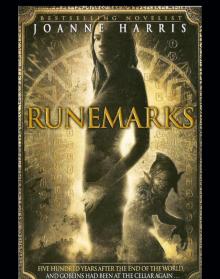- Home
- Joanne Harris
Coastliners Page 4
Coastliners Read online
Page 4
As I approached the Pointe I could see figures silhouetted against the firelit wall of the old church. Many of them, thirty at least, more than half the village. Père Alban, the island priest, was standing by the water, his chalice and staff in his hands. Looking gray and drawn in the firelight, he greeted me briefly and without surprise as I passed. I noticed he smelled vaguely of fish, his soutane tucked neatly into his fishing waders.
The old ceremony is a strangely moving sight, although the villagers of Les Salants are quite unaware that they are picturesque. They are a different race from myself and my mother—short and stocky for the most part, small featured, Celtic; black haired, blue eyed. These striking looks fade quickly, however, and they become gargoyles in old age, wearing the black of their ancestors and—for the women—the white quichenotte. At any time, three-quarters of the population appears to be over sixty-five.
I scanned the faces rapidly, hopefully. Old women in perpetual mourning, long-haired old men in fishing gaiters and black cloth coats or vareuses and boots, a couple of young men, the fisherman’s gear brightened by the addition of a garish shirt. My father was not among them.
The celebratory atmosphere I remembered from childhood seemed to be missing this year; there were fewer flowers around the shrine, and little sign of the usual offerings. Instead I thought the villagers had a grim look, like people under siege, although perhaps this was merely the difference between a child’s perception and that of the adult I had become.
Finally it came; a glow of lamplight from the dunes beyond Pointe Griznoz and the wailing sound of biniou players as Sainte-Marine’s procession began. The biniou is a traditional instrument; played well, it sounds a little like bagpipes. In this case there was something feline in the sound, a keening note that cut across the drone of the wind.
I could see the plinth with the Saint perched on it; four men, one at each corner, struggled to carry it across the rough ground. As the procession came closer I could pick out details: the mound of red and white flowers below Sainte-Marine’s ceremonial skirts, the paper lanterns, the fresh gilding on the old stone. Here too were the Salannais children, faces scubbed pink by the wind, voices shrill with exhaustion and nerves. I recognized Capucine’s grandson, the round-faced Lolo, and his friend Damien, both carrying paper lanterns—one green, one red—running easily across the sand.
The procession rounded the last dune. As it did, the wind caught one of the lanterns and it burst into flames; and in the sudden brightness I recognized my father.
He was one of the bearers, and for a moment I was able to see him clearly without being observed. The firelight was kind; in its glow his face seemed scarcely to have changed, and it gave his features an uncharacteristic, animated look. He was heavier than I remembered; thickened by age; his big arms straining to hold the plinth level. There was a terrible concentration in his face. The Saint’s other bearers were all younger men; I noticed Alain Guénolé and his son Ghislain, both fishermen, used to heavy work. As the procession came to rest in front of the group of expectant villagers, I was surprised to see that the last bearer was Flynn.
“Santa Marina.” A woman from the crowd in front of me stepped forward and pressed her lips briefly to the feet of the Saint. I recognized her; it was Charlotte Prossage, who ran the grocery, a plump and birdlike woman with a look of perpetual anxiety. The others kept a respectful distance away, some fingering amulets or photographs.
“Santa Marina. Bring back our business. The winter tides always flood the fields. It took me three months to clear them last time. You’re our Saint. Take care of us.” Her voice managed to sound both humble and slightly resentful. Her eyes flicked restlessly here and there.
The moment Charlotte’s prayer was over, others took her place. Her husband, Omer, nicknamed La Patate for his comic, shapeless face; Hilaire, the Salannais vet, with his bald head and round glasses. Fishermen, widows, a teenage girl with restless eyes, all speaking in the same rapid and slightly accusing mutter. I could not push through without giving offense; GrosJean’s face was obscured once more behind the tide of bobbing heads.
“Marine-de-la-Mer. Keep the sea from my door. Bring the mackerel to my nets. Keep that poacher Guénolé from my oyster beds.”
“Sainte-Marine, bring us good fishing. Keep my son safe when he goes out to sea.”
“Sainte-Marine, I want a red bikini and some Ray-Ban sunglasses.” The girl glanced briefly at me as she stepped away from the Saint. I recognized her now; it was Mercédès, daughter of Charlotte and Omer, who had been seven or eight when I left the island, now tall and leggy, with loose hair and a sullen, pretty mouth. Our eyes met; I smiled, but the girl merely shot me a look of dislike and pushed past me into the crowd. Someone else took her place; an old woman in a head scarf, her face bent pleadingly over a battered photograph.
The procession was on the move again; down toward the sea, where the Saint’s feet would be lowered into the water to be blessed. I reached the far side of the crowd just as GrosJean was turning away; I saw his profile, now beaded with sweat, glimpsed the flash of a pendant around his neck, and failed once more to catch his eye. A moment longer and it was too late; now the bearers were struggling down the rocky incline toward the water’s edge, Père Alban holding out a hand to keep the Saint from toppling. The biniou wailed forlornly; a second lantern caught fire, then a third, scattering black butterflies across the wind.
They reached the sea at last; Père Alban stood aside and the four bearers carried Sainte-Marine into the water. There is no sand at the Pointe, only stones underfoot, and the going was bright and treacherous in the light that ricocheted from the water. The tide was almost high. Behind the squeal of the biniou, I thought I could hear the first sounds of the wind through the crevices, the hollow drone of the south wind, which would soon amplify to a booming almost like that of a drowned bell. . . .
“La Marinette!” It was the old woman in the head scarf, Désirée Bastonnet; her eyes dark with dread. Her thin, nervous hands still played on the photograph, from which the smiling face of a boy reflected the lamplight.
“No it isn’t.” That was Aristide, her husband, head of the fishing clan of the same name; an old man of seventy or more, with a big chieftain’s mustache and long gray hair under his flat island hat. He lost a leg years before I was born, in the same fishing accident that had killed his eldest son. He gave me a sharp look as I passed him. “No more of that bad-luck talk, Désirée,” he told his wife in a low voice. “And put that thing away.”
Désirée averted her eyes and folded her fingers over the picture. Behind her, a young man of nineteen or twenty glanced at me with shy curiosity from behind small wire-framed glasses. He seemed about to say something, but at that moment Aristide turned around and the young man hurried to join him, his bare feet making no sound on the rocks.
The bearers were standing chest-deep now, facing the shore and holding the Saint with her feet in the water. Waves splashed against the base of the plinth, washing the flowers into the current. Alain and Ghislain Guénolé had taken the front position; Flynn and my father the back, bracing themselves against the swell. Even in August it must have been cold work; the chill from the flying spray numbed my face, and the wind cut through my woollen coat so that I shivered. And I at least was dry.
When all the villagers had taken their places, Père Alban lifted his staff for the final blessing. At that second GrosJean raised his head in the direction of the priest, and our eyes met.
For a moment my father and I existed inside a pocket of silence. He stared at me from between the feet of the Saint, mouth slightly open, a line of concentration between his eyes. The pendant around his neck burned red.
There was something in my throat, some kind of obstacle, which made it difficult for me to breathe. My hands felt as if they belonged to someone else.
Next to my father, I thought I saw Flynn make some gesture. Then a wave broke sharply behind them, and GrosJean, still looking at me, stumbled in
its swell, lost his footing, held out a hand to steady himself . . . and dropped Sainte-Marine from the plinth into the deep water of Pointe Griznoz.
For a frozen second she seemed to float, miraculously, in the fiery sea; the silk skirt belling crimson around her. Then she was gone.
GrosJean stood helplessly, staring at nothing. Père Alban made a futile grab for the fallen Saint. Aristide gave a crack of surprised laughter. Behind him, the bespectacled young man took a step toward the water, then stopped. For a moment, no one moved. Then a moan came up from the Salannais, joining the moan of the wind. My father stood there for a second longer, the lantern lights absurdly festive on features that had lost all other animation. Then he fled, hauling himself out of the sea, slipping on the rocks, forcing himself upright once again, struggling in his heavy, waterlogged clothing.
“Father—” I called as he reached me, but he had already gone without a backward glance. As he reached the head of Pointe Griznoz I thought I heard him make a sound; a long, torn, moaning noise, but that might have been the wind.
6
* * *
Traditionally, after the cliff-top ceremony everyone goes to Angélo’s bar for a drink on the Saint. This year less than half the worshipers did; Père Alban went straight home to La Houssinière without so much as blessing the wine; the children—and most of their mothers—went to bed, and the usual exuberance was noticeably lacking.
Of course, the loss of Sainte-Marine was the principal reason. Without her, their prayers would go unanswered; the tide unchecked. My father’s distress was clearly secondary to their superstitious fears, and I was annoyed at the ease with which his flight had been dismissed. Omer La Patate had suggested an immediate search for the missing Saint, but the tide was too high and the rocks too uneven for safety, and the operation was delayed until the morning.
For myself, I went straight to the house and waited for GrosJean to come home. He did not come. Finally, at about midnight, I went back to Angélo’s, where I found Capucine restoring her nerves over coffee and devinnoiseries.
She stood up when she saw me, concern in her face.
“He’s not there,” I said, sitting next to her. “He hasn’t come home.”
“He won’t. Not now,” said Capucine.
People were looking at me; I sensed curiosity, and a coolness that made me feel stiff and strange. Capucine lit a cigarette and blew smoke through her nostrils and spoke matter-of-factly, though not without sympathy: “You always were stubborn. Never could take the easy way, could you? Always rushing at things head-on.” She gave me a tired smile. “Give your father some space, Mado. Give him a chance.”
“A chance?” It was Aristide Bastonnet, with Désirée on his arm. “After tonight, after what happened at the Pointe, what chance do we have?”
I looked up. The old man was standing behind us, leaning heavily on his stick, his eyes like flints. The young man with the glasses stood slightly to one side, his hair falling over his eyes, looking embarrassed. Now I knew him; it was Xavier, Aristide’s grandson; he’d been a solitary boy in the old days, preferring books to games. Only a few years apart in age, we had rarely spoken.
Aristide was still glaring at me. “What did you come back for, heh?” he demanded. “There’s nothing here anymore.”
“Don’t answer,” said Capucine. “He’s drunk.”
Aristide showed no sign of having heard her. “You’re all the same, you young people!” he said. “You only come back when you want something!”
“Grandfather—” protested Xavier, putting his hand on the old man’s shoulder. But Aristide shook him aside. Though the old man was a head shorter, his rage made a giant of him, his eyes burning like a prophet’s.
Beside him, his wife looked at me nervously. “I’m sorry,” she said in a low voice. “Sainte Marine—our son—”
“Be quiet!” snapped Aristide, turning so sharply on his stick that, if Désirée had not been standing so close, he might have fallen. “Do you think she cares about that, heh?”
He left without a backward glance, his people in his wake, his wooden leg dragging on the concrete floor. Silence followed them.
Capucine shrugged. “Don’t mind him, Mado. He’s just had a devinnoise too many.”
“I don’t understand.”
“Nothing to understand,” said Matthias Guénolé. “He’s a Bastonnet. Head full of rocks.” This was less encouraging than it might have seemed; the Guénolés have hated the Bastonnets for generations.
“Poor Aristide. There always has to be some conspiracy.” I turned and saw a tiny old woman in widow’s black perched on the stool beside me. Toinette Prossage, Omer’s mother and the village’s oldest resident. “As far as Aristide’s concerned people are always trying to get him put away, people after his savings—heh!” She gave a crow of laughter. “As if everyone didn’t know he’s spent so much on his house—Bonne Marine! Even if his boy came back after all these years, there’d be nothing left for him but an old boat and a strip of waterlogged land that even Brismand wouldn’t take off his hands.”
I fingered the letter, which was still in my pocket. “Brismand?”
“Of course,” said Toinette. “Who else could afford to develop this place?”
According to Toinette, Brismand had plans for Les Salants. Plans that were as sinister as they were unclear. I recognized the Salannais’ traditional dislike of a successful Houssin.
“He could do the job on Les Salants—pfft! Just like that,” said the old woman, with an expressive gesture. “He’s got the money and the machines. Drain out the marshes, raise some defenses at La Goulue—he could have it done in six months. No more floods. Heh! All for a price, mind you. He’s not made his money doing favors.”
“Maybe you should see what he has to suggest.”
Matthias Guénolé looked at me sourly. “What, sell out to an Houssin?”
“Leave her alone,” said Capucine. “The girl means well.”
“Yes, but if he could stop the flooding—”
Matthias shook his head with finality. “You can’t control the sea,” he said. “It does as it likes. If the Saint wants to drown us, she will.”
It had been a succession of bad years, I learned. Despite Sainte-Marine’s protection, the tides had risen higher every winter. This year, even the Rue de l’Océan had been flooded, for the first time since the war. Summer too had been unusually troubled. The creek had swollen and sunk half the village under three feet of seawater, damage that had not yet been entirely repaired.
“We’ll end up like the old village, at this rate,” said Matthias. “Everything drowned, even the church.” He filled his pipe and tamped down the tobacco with a grimy thumb. “I mean. A church. If the Saint can’t help, who can?”
“Now that was a Black Year,” declared Toinette Prossage. “1908 it was. My sister Marie-Laure died that year, of the influenza, the winter I was born.” She stabbed the air with a crooked finger. “That was me, a Black Year baby; never expected to survive. But I did! And if we want to survive this one, we should do something more than snap at each other like gannets.” She peered sternly at Matthias.
“Easy to say, Toinette, but if the Saint isn’t behind us—”
“That’s not what I meant, Matthias Guénolé, and you know it.”
Matthias shrugged. “It wasn’t me who started that business,” he said. “If Aristide Bastonnet would just admit, for once, that he was wrong—”
Toinette turned to me, her eyes snapping. “You see what it’s like? Grown men—old men—behaving like little children. No wonder the Saint shows her displeasure.”
Matthias bristled. “It wasn’t my boys who dropped the Saint—” Capucine glared at him. He looked abashed. “I’m sorry,” he told me. “No one blames GrosJean for that. If anything, it’s Aristide’s fault. He wouldn’t let his grandson carry the Saint because there would have been two Guénolés, and only one Bastonnet. Of course he couldn’t help. Not with his wooden leg.” He
sighed. “I’ve told you before. It’s going to be a Black Year. You heard La Marinette ringing, didn’t you?”
“That wasn’t La Marinette,” said Capucine. Automatically, her left hand forked the sign against mischance. I saw Matthias do the same.
“I tell you, we’ve got it coming, it’s been thirty years—”
Matthias forked the sign again. “ ’72. That was a bad year.”
I knew it was; that year had seen the death of three villagers, one of them my father’s brother.
Matthias took a drink of his devinnoise. “Once, Aristide thought he’d found La Marinette, you know. Early that spring, that was, the year he lost his leg. Turned out it was an old mine left over from the first war. Ironic, don’t you think?”
I agreed it was. I listened as politely as I could, although this was a tale I’d heard many times as a child. Nothing had changed, I told myself with a kind of despair. Even the stories were as old and tired as the inhabitants, worked and reworked like worry beads on a string. Pity and impatience welled up inside me, and I gave a deep sigh. Matthias continued, oblivious, as if the incident had happened yesterday.
“The thing was half-buried in a bank of sand. It rang when you hit it with a stone. All the kids came around then with sticks and pieces of rock, trying to make it ring. Hours later, when the tide took it back out, it exploded, all on its own, a hundred meters from where La Jetée is now. Just about killed every fish from there to Les Salants. Heh!” Matthias sucked on his pipe with mournful gusto. “Désirée made a bucketload of bouillabaisse because she couldn’t bear the thought of all those fish going to waste. Poisoned half the village.” He looked at me from red-rimmed eyes. “I could never decide whether there’d been a miracle or not.”

 The Evil Seed
The Evil Seed Gentlemen and Players
Gentlemen and Players A Cat, a Hat, and a Piece of String
A Cat, a Hat, and a Piece of String Different Class
Different Class Chocolat
Chocolat Five Quarters of the Orange: A Novel
Five Quarters of the Orange: A Novel A Pocketful of Crows
A Pocketful of Crows Runelight
Runelight Runemarks
Runemarks Jigs & Reels: Stories
Jigs & Reels: Stories Sleep, Pale Sister
Sleep, Pale Sister Holy Fools
Holy Fools The Testament of Loki
The Testament of Loki Peaches for Monsieur Le Curé
Peaches for Monsieur Le Curé Blueeyedboy
Blueeyedboy The Lollipop Shoes
The Lollipop Shoes Coastliners
Coastliners Jigs & Reels
Jigs & Reels Five Quarters of the Orange
Five Quarters of the Orange